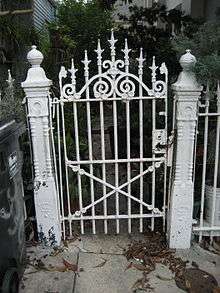gate
English
Pronunciation

- IPA(key): /ɡeɪt/
Audio (GA) (file) Audio (AU) (file) - Rhymes: -eɪt
Etymology 1
From Middle English gate, gat, ȝate, ȝeat, from Old English gæt, gat, ġeat (“a gate, door”), from Proto-Germanic *gatą (“hole, opening”) (compare Old Norse gat, Swedish and Dutch gat, Low German Gaat, Gööt), from Proto-Indo-European *ǵʰed- (“to defecate”) (compare Albanian dhjes, Ancient Greek χέζω (khézō), Old Armenian ձետ (jet, “tail”), Avestan 𐬰𐬀𐬛𐬀𐬵 (zadah, “rump”)).
Alternative forms
- yate (obsolete or dialectal)
Noun
gate (plural gates)
- A doorlike structure outside a house.
- Doorway, opening, or passage in a fence or wall.
- Movable barrier.
- The gate in front of the railroad crossing went up after the train had passed.
- (computing) A logical pathway made up of switches which turn on or off. Examples are and, or, nand, etc.
- (cricket) The gap between a batsman's bat and pad.
- Singh was bowled through the gate, a very disappointing way for a world-class batsman to get out.
- The amount of money made by selling tickets to a concert or a sports event.
- (flow cytometry) A line that separates particle type-clusters on two-dimensional dot plots.
- Passageway (as in an air terminal) where passengers can embark or disembark.
- (electronics) The controlling terminal of a field effect transistor (FET).
- In a lock tumbler, the opening for the stump of the bolt to pass through or into.
- (metalworking) The channel or opening through which metal is poured into the mould; the ingate.
- The waste piece of metal cast in the opening; a sprue or sullage piece. Also written geat and git.
- (cinematography) A mechanism, in a film camera and projector, that holds each frame momentarily stationary behind the aperture.
- A tally mark consisting of four vertical bars crossed by a diagonal, representing a count of five.
Synonyms
- (computing): logic gate
Derived terms
Translations
|
|
|
|
|
|
- The translations below need to be checked and inserted above into the appropriate translation tables, removing any numbers. Numbers do not necessarily match those in definitions. See instructions at Wiktionary:Entry layout#Translations.
Verb
gate (third-person singular simple present gates, present participle gating, simple past and past participle gated)
- To keep something inside by means of a closed gate.
- To punish, especially a child or teenager, by not allowing them to go out.
- Synonym: ground
- 1971, E. M. Forster, Maurice, Penguin, 1972, Chapter 13, p. 72,
- “I’ve missed two lectures already,” remarked Maurice, who was breakfasting in his pyjamas.
- “Cut them all — he’ll only gate you.”
- (biochemistry) To open a closed ion channel.[1]
- (transitive) To furnish with a gate.
- (transitive) To turn (an image intensifier) on and off selectively as needed, or to avoid damage. See autogating.
Etymology 2
Borrowed from Old Norse gata, from Proto-Germanic *gatwǭ. Cognate with Danish gade, Swedish gata, German Gasse (“lane”).
Noun
gate (plural gates)
- (now Scotland, Northern England) A way, path.
- Sir Walter Scott
- I was going to be an honest man; but the devil has this very day flung first a lawyer, and then a woman, in my gate.
- Sir Walter Scott
- (obsolete) A journey.
- 1590, Edmund Spenser, The Faerie Qveene. […], London: Printed [by John Wolfe] for VVilliam Ponsonbie, OCLC 960102938, book II, canto XII:
- […] nought regarding, they kept on their gate, / And all her vaine allurements did forsake […]
-
- (Scotland, Northern England) A street; now used especially as a combining form to make the name of a street e.g. "Briggate" (a common street name in the north of England meaning "Bridge Street") or Kirkgate meaning "Church Street".
- (Britain, Scotland, dialectal, archaic) Manner; gait.
References
- Alberts, Bruce; et al. "Figure 11-21: The gating of ion channels." In: Molecular Biology of the Cell, ed. Senior, Sarah Gibbs. New York: Garland Science, 2002 [cited 18 December 2009]. Available from: http://www.ncbi.nlm.nih.gov/bookshelf/br.fcgi?book=mboc4&part=A1986&rendertype=figure&id=A2030.
Afrikaans
Dutch
Pronunciation
Audio (file)
Mauritian Creole
Pronunciation
- IPA(key): /ɡeːt/
Pronunciation
- IPA(key): /ɡate/
Pronunciation
- IPA(key): /ɡate/
Middle English
Etymology 1
From Old English ġeat, ġet, gat, from Proto-Germanic *gatą.
Pronunciation
- IPA(key): /ɡaːt/, /ɡat/, /jɛt/, /jat/, /jaːt/
Noun
gate (plural gates or gaten or gate)
- An entryway or entrance to a settlement or building; a gateway.
- A gate (door barring an entrance or gap in a fence)
- (figuratively) A method or way of doing something or getting somewhere.
- (figuratively) Any kind of entrance or entryway; e.g. a crossing through mountains.
References
- “gāte (n.(1))” in MED Online, Ann Arbor, Mich.: University of Michigan, 2007, retrieved 2018-06-12.
Etymology 2
From Old Norse gata, from Proto-Germanic *gatwǭ.
Pronunciation
- IPA(key): /ˈɡaːt(ə)/, /ˈɡat(ə)/
Noun
gate (plural gates)
- A way, path or avenue; a trail or route.
- A voyage, adventure or leaving; one's course on the road.
- The way which one acts; one's mode of behaviour:
References
- “gā̆te (n.(2))” in MED Online, Ann Arbor, Mich.: University of Michigan, 2007, retrieved 2018-06-12.
Norwegian Bokmål
Noun
gate f or m (definite singular gata or gaten, indefinite plural gater, definite plural gatene)
- a street
Derived terms
Norwegian Nynorsk
Derived terms
Portuguese
Pronunciation
- (Brazil) IPA(key): /ˈɡejt͡ʃ/
Synonyms
- porta (more common)
Etymology 2
Etymology 3
Scots
Ternate
Synonyms
References
- Rika Hayami-Allen (2001). A Descriptive Study of the Language of Ternate, the Northern Moluccas, Indonesia. University of Pittsburgh